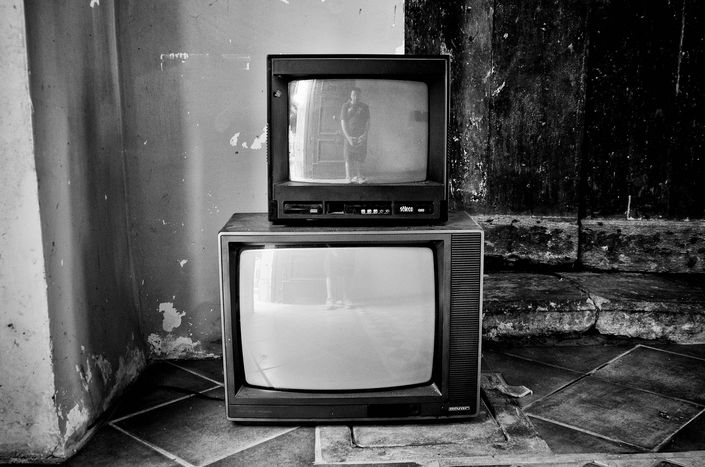
Europe and the Small Screen
Published on
Europe is not the most telegenic topic. In any case, this is what we say. But why this reluctance? Maybe because of unfamiliarity with the political figures. Not easy to find interest in sequences on gloomily dressed strangers emerging from a meeting with armloads of files!
And when the 8 O’clock news talks about Europe, it is often to announce a new directive, illustrated by a shot of the European Commission or the European Parliament. That being said, these subjects are sometimes followed by a series of interpretations. And there, it becomes interesting and even telegenic!
It seems that as far as the French television programmes on Europe are concerned, the watchword is: the concrete! Let us then review some French TV programmes with European colours.
The French and the Germans are for a single television programme on Europe: a recipe that works?
When one thinks of Europe on TV, it comes down to Arte, the Franco-German channel. In addition to the two daily newspapers on European current affairs, the channel offers a magazine called Zoom Europa. To lend it a voice, Arte has chosen a familiar voice known to regular listeners of France Inter since Bruno Duvic presents on it the morning news. On the website of the show, the host announces the tone: “we will try to avoid political doublespeak, jargon and the incomprehensible technical terms.” The show addresses every week, in a relaxed tone, subjects as varied as “free fight”, pet markets and the prevention of HIV in Estonia, as part of the “fight against HIV” weekend. Zoom Europa or when Europe interferes in everything!
The French and the Germans are for a single television programme on Europe: a recipe that works?
When one thinks of Europe on TV, it comes down to Arte, the Franco-German channel. In addition to the two daily newspapers on European current affairs, the channel offers a magazine called Zoom Europa. To lend it a voice, Arte has chosen a familiar voice known to regular listeners of France Inter since Bruno Duvic presents on it the morning news. On the website of the show, the host announces the tone: “we will try to avoid political doublespeak, jargon and the incomprehensible technical terms.” The show addresses every week, in a relaxed tone, subjects as varied as “free fight”, pet markets and the prevention of HIV in Estonia, as part of the “fight against HIV” weekend. Zoom Europa or when Europe interferes in everything!
Here, the guests spice up the programmes
Then at LCP (the Parliamentary Channel), a TV channel used to broadcast the process of institutional decision making. First, note that the makers of the programme have the following episodes in their minds: the episodes are titled “implied treaties”, “important treaties” or “very useful”! On 10th March, a complete report on the Parliamentary approval of the Treaty of Lisbon wore a very American series look with a soundtrack and a disturbing display of 24 hours count down. That is what undoubtedly makes a hectic night’s meeting at the National Assembly. Would you say “a little too much”? It is necessary to know what one wants! Then, the host launched the portrait of a young director of radio and television, which intended to lend “flesh and glamour to Europe”. So zoom on to a frenetic flamenco sequence to show “what is most erotic” in Europe: otherwise to push up the audience numbers! More seriously, the additional advantage of this issue is undoubtedly the presence of guests who comment on the television reports and thereby broaden the debate.
And on the public television?
All this is fine but what about the public television? On France 2, we have known the show “union libre”, by Christine Bravo, dealing lightly with Europe without focusing on the political aspect. The concept was simple: representatives of various member countries discussed around a table culinary traditions or unusual initiatives in their respective countries. It also organised surveys to find out which country had the greatest number of pets or which Europeans ate the maximum number of pizzas. In short, an entertainment show like any other but with the peculiarity of proposing a European tour .However, this programme has been omitted from the schedule. Invited to the show “Plus Clair on Canal +, Jean François Copé (who heads the commission on the future of public television) stated clearly in March that there was no longer a programme on French TV devoted to Europe. But it was without taking into account: “Avenue de l’Europe.” This weekly ten-minute programme addresses a general theme such as sustainable development or abortion. The approach is to compare the different examples of member countries to show what solutions can be proposed to a general problem. Thus, in a programme devoted to obesity, the anchor, Véronique Auger, announced that, while waiting for a European project on the subject (about the control of food labels), several TV programmes would present the various means used by member countries to tackle the problem. A short and dynamic TV programme, broadcasted just before 8 O’clock every Saturday.
And if what was missing was a debate?
So we have a programme designed to decipher European issues and show a diversity of viewpoints. However, when he spoke, Jean-François Copé quoted France Europe Express, a programme which has disappeared from our screens. For an hour and a half, Christine Ockrent hosted a guest and detractors expressing views. Maybe that is what is missing today: a show that would propose contradictory views and positions concerning European issues in France. Let’s recall the ideas bubbling around the drafting of the constitutional treaty!
Haude-Marie Thomas
Translated from french by Sohanjit HALDER.



